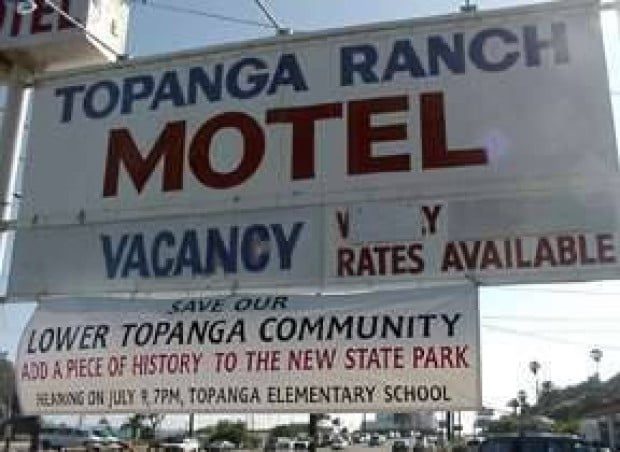Responding to attempts by tenants of the Lower Topanga area to stay put on 1,659 acres that the California State Parks Department is buying and turning into a park, the vice president who oversees the property threatened to evict all tenants and sell to developers.
Fred Zepeda, vice president of LAACO, LTD, said, “I have offers from developers.”
He stated that if the deal falls through, then he would evict all tenants and sell the land to private parties.
This was after both sides agreed that the land would be in better hands with the state rather than private developers and that the acquisition of the land needs to happen soon or funds may be reappropriated ($40 million of Prop 12 funds, and additional $8 million have been obtained for the purchase). And after tenants and legal representatives continued to argue that the tenants should be allowed to stay on the land where they have lived and operated businesses for more than 30 years.
“The question before you tonight is not whether or not the land should be acquired. The question, is at what human, economic and social costs,” said Frank Angel, attorney representing tenants who face eviction.
“The sociological profile of the tenants is very different from Crystal Cove,” he said, speaking of a similar situation in Crystal Cove State Park, where tenants were recently evicted from a beachside community in Orange County. “These are not vacation homes; the tenants live in there year round.”
The law governing relocation plans would obligate the state to provide comparable housing and they cannot, explained Angel.
While there is a potential for the businesses on the property to stay, residents are hoping for the same.
Residents who live on the property, which has been owned by the Los Angeles Athletic Club since the 1920s, are asking for long-term leases from their new landlord.
In an effort to be heard, residents and businesses have gathered signatures petitioning the state to let them stay, and claim that 10,000 people have signed.
“We are really a community, not just a bunch of houses,” they said, claiming that relocation in similar housing as a community is not possible. “We are a community of artists and craftsmen with an alternative lifestyle.”
“In the past I have done ceremonies to bless your activities but not this time,” said Chokosh Auh-ho-oh, a Native American representative. “That area is sacred ground, it was a place of ceremony and it has artifacts of our people.”
“If you choose to move on these people with heavy equipment, we will be standing there to stop you,” she said, concerned that the area will be paved over for a parking lot.
Park officials first gave a Power Point presentation at the standing room only meeting, explaining why they believe this land should be acquired and preserved.
But, “This meeting is only to hear your comments, not about future land-use plans, which will be discussed later, extensively,” said Warren Westrup, manager of acquisitions for State Parks.
While State Parks receives the support of various local environmental organizations like the Santa Monica Mountains Conservancy, Heal-the-Bay, the San Fernando Valley Audubon Society, the Sierra Club and others regarding the acquisition, the majority of these groups did not directly oppose tenants desire to stay.
Among them, Joe Edmiston, head of the Santa Monica Mountains Conservancy, offered $2 million to move the people out quickly, stating that it was for their own good.
Otherwise, most of the speakers concurred that the tenants have been good stewards of the land; in fact, they have preserved it so well that State Parks is now buying it because the area continues to offer a refuge to endangered wildlife.
But tenants do not want to be relocated in a fast-paced method, they pleaded to the state once more, asking for time.
“This is land I always felt should be with State Parks,” said Scott Dittrich, co-chair of the tenants group, Lower Topanga Community. “But forcing relocation is no answer. There is no reason for this rapid transition and fast track eviction. We can co-exist.”
People can already hike the trails, and the septic systems in the houses have never been proven to be defective, he said, in response to accusations that residents were blocking access to the public and polluting the creek with defective septic systems.
At the very end of the meeting, Rusty Areias, director of State Parks, said he would support a solution acceptable for all, but the details still need to be worked out.

